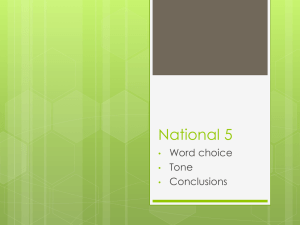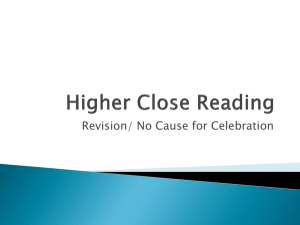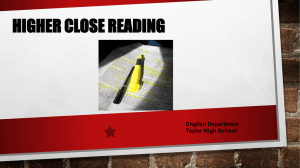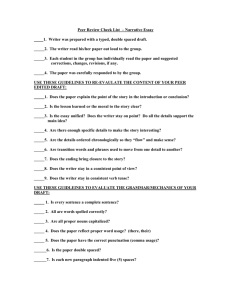Close Reading Skills
advertisement
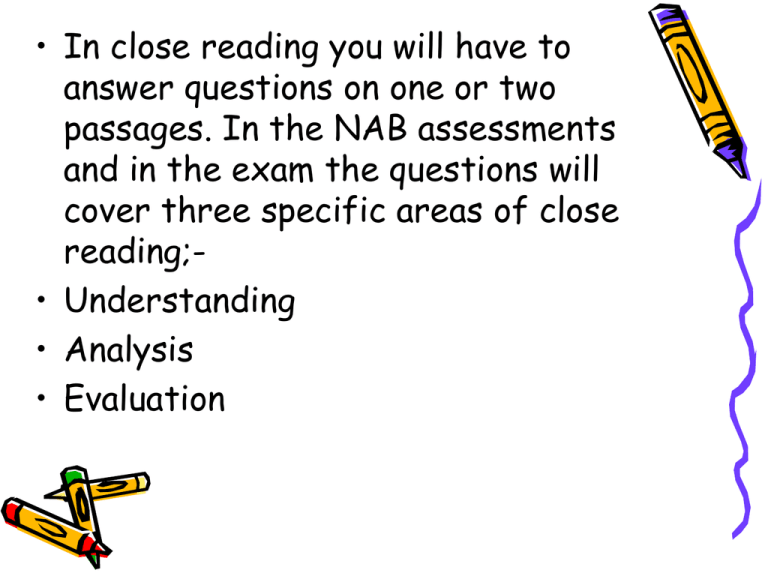
• In close reading you will have to
answer questions on one or two
passages. In the NAB assessments
and in the exam the questions will
cover three specific areas of close
reading;• Understanding
• Analysis
• Evaluation
Close Reading Skills
How to tackle the Questions
• Understanding word choice
• Questions about word choice are very
common in the Higher Close Reading
papers. Often a question will ask you to
deal specifically with word choice. Other
questions might ask you to consider word
choice among other techniques.
• Words used in different contexts
can have different connotations.
When you answer a question about
word choice you are not only being
asked what that word means but to
consider how that meaning is
affected by the context of the
passage. You will be able to infer a
great deal about writers' opinions
from the words they use.
• Examples
• One question asks, 'Should parents be allowed
to smack their children?' and another asks,
'Should parents be allowed to strike their
children?'
• Both are asking almost the same but the first
seems to be less against 'smacking' than the
second speaker, because the word 'strike'
suggests something more violent and
aggressive than 'smack', which has
connotations of a more gentle action, a slap
rather than a blow.
• Would you rather have a 'crowd' outside your
house or a 'mob'? Probably a crowd, since
'mob' has connotations of an unruly, rather
threatening group.
• When a group of workers is looking for a
pay-rise, newspapers who support them
will usually write something like:
• 'Sheet metal workers are asking for a
20% increase‘
• while newspapers who are opposed to
them will probably say they are
'demanding a 20% increase'. Why?
Because, although the figures are the
same, 'demanding' suggests a more
aggressive, unreasonable approach.
• 'She looked at Sharon's new hairstyle,
and sniggered.'
• What does the choice of the word
'sniggered' here suggest about her
attitude to Sharon? Friendly?
Sympathetic? Respectful?
• Surely not. If the writer had wanted to
suggest that, she'd have chosen a word
like 'chuckle' or 'giggle' that suggest a
more friendly, warm kind of laughter.
'Sniggered' suggests a bit of contempt, a
bit of a sneer.
• Word choice
• Read the following short text extracts with
questions on word choice
• 1 'A nine-year-old boy is attacked and killed
while fleeing from dingoes on a beach at
Fraser Island, in north-eastern Australia. The
news, as rare as it is horrifying, elicits the
predictably violent response. There have been
calls for the wholesale destruction of the
island's 160 protected dingoes. Past attacks
are dredged up and enumerated in graphic
detail.'
• Which of these statements conveys the
author's disapproval of the suggestion that all
the dingoes should be killed:
• The writer does this using words like
'violent', 'destruction', 'dredged up',
'enumerated' and 'graphic' which all
show how strongly he feels.
• The word 'predictably' implies people
are responding automatically, without
thought and that they are unoriginal
and dull; while 'dredged up' implies
they are digging deep into the past
to come up with any old excuse they
can find.
• The words 'violent' and 'destruction'
both suggest how aggressive the
people's response is and the writer
makes it clear he disapproves of this.
• The writer uses many words that
show how irresponsible, thoughtless
and aggressive these people are being
and so makes his disapproval quite
clear.
• You said: The word 'predictably'
implies people are responding
automatically, without thought and
that they are unoriginal and dull;
while 'dredged up' implies they are
digging deep into the past to come up
with any old excuse they can find.
Well done!
• 2 'Inevitably, there will be isolated casualties. I know
of a mountain lion that killed a jogger in Denver,
Colorado. A child died after it was mauled by an urban
coyote in the States. And now the tragic case of the
boy killed by a rogue dingo. But these cases make news
precisely because of their extreme rarity. We must
not be provoked into a frenzy of over-reactive culling
as a result of this latest tragedy. The key to
harmonious co-habitation is encapsulated in one word:
respect.'
• Show how the word choice in the sentence 'We must
not ... latest tragedy' is important in emphasising the
writer's point of view:
'culling' is an emotive word suggesting
extensive, possibly unnecessary, killing
'frenzy' suggests they're mad.
It emphasises the writer's point of view
by using the word 'provoked'. This means
we must not be provoked into something
we should not do and also 'over-reactive'
which means people must not overreact to
the situation.
'provoked' means the other people are
trying to make us do something against our
will; 'must not' is very strong and
assertive.
•
You said: 'culling' is an emotive word
suggesting extensive, possibly
unnecessary, killing.
Well done! This answer looks at the
implications of the word 'culling'.
• 3 'I'm not sure what to call them, since it
is hard to describe these constructions,
with their inanely grinning, appallingly-paid
staff dressed like circus clowns dispensing
lumps of fatty meat and slices of crumpled
salad in soggy buns, accompanied by tubs
of steaming hot French fries and teethrotting drinks, as 'restaurants'. True, they
are 'places where food is bought and
eaten', but it would be a sad world if these
were really considered restaurants.'
• Show how the writer's word choice in this
paragraph makes clear her contempt for
fast food restaurants
• She says they are 'inanely grinning,
appallingly-paid staff dressed like
circus clowns' and that they serve
'lumps of fatty meat and slices of
crumpled salad in soggy buns' - she
thinks it is all terrible.
• She says the food is unhealthy, the
staff are badly paid and stupidly
dressed. She calls them 'constructions'
which sounds unfriendly.
• The use of 'circus' and 'clowns' makes them
seem ridiculous, and 'lumps' does not sound
very appealing or healthy.
• She is contemptuous of the staff ('inanely
grinning' suggests they look almost mad, and
'circus' makes the whole thing sound like an
elaborate sideshow) and of the food (she
uses 'lumps' rather than 'portions' to
suggest something unappealing and inelegant,
and describes the salad as 'crumpled' and
'soggy' making it sound lifeless and weak).
•
You said: She is contemptuous of the
staff ('inanely grinning' suggests they
look almost mad, and 'circus' makes the
whole thing sound like an elaborate
sideshow) and of the food (she uses
'lumps' rather than 'portions' to suggest
something unappealing and inelegant, and
describes the salad as 'crumpled' and
'soggy' making it sound lifeless and
weak).
Well done! This answer goes into detail
and provides an excellent focus on the
word choice.
• Ever since I was a child, museums have
fascinated me. I love them. Even the
most dusty and drab have a magic for me.
I was the despair of my mother when I
was a child, for I was always bringing
home fossils, bits of interesting rock, and
such like, to add to the overburdened
windowsill museum which I had.
• Show how the word choice in this
paragraph emphasises the writer's
interest in museums:
• He tells us how much he likes museums and
that he always has liked them. He likes
every type of museum, no matter how old
or drab.
• 'Magic' suggests enchantment and
pleasure; 'fascinated' has connotations of
being deeply and enjoyably absorbed.
• The writer emphasises his interest in
museums by using the word 'magic' which
suggests there is something special, almost
unexplainably appealing about them.
• Words like 'magic' and 'fascinated' show
how the writer is attracted to museums.
•
You said: 'Magic' suggests
enchantment and pleasure;
'fascinated' has connotations of
being deeply and enjoyably absorbed.
Well done! This answer offers
interesting observations on the use
of 'magic' and 'fascinated'.
• 'Football today is being hijacked and often
corrupted by commercial interests, the fans
exploited, their loyalty taken for granted or
abused. The men and women who have
supported the game all their lives are treated
as mere consumers of a product on which those
who run the clubs have a monopoly of supply.
The more cash they can screw out of the fans
the better. And they call it sport. Welcome to
the world of commercial football.'
• Show how the word choice in this paragraph
make clear the writer's feelings about football
today:
The writer's anger and despair are
conveyed by words like 'hijacked' which
suggests something being illegally, almost
violently, changed from its true purpose;
'corrupted' which has connotations of
immorality and deceit; and 'screw' which
makes the football bosses sound like
cheap fraudsters.
He says the fans are being 'abused'. This
suggests they are being treated in a
harmful way.
• He uses words like: 'hijacked,
corrupted, exploited, abused, mere,
monopoly, screw'; all these words
show he feels that the fans are being
treated badly.
A 'monopoly' is usually considered to
be a bad thing because it means that
only one person or group is in control,
restricting the rights of others.
• You said: The writer's anger and
despair are conveyed by words like
'hijacked' which suggests something
being illegally, almost violently,
changed from its true purpose;
'corrupted' which has connotations of
immorality and deceit; and 'screw'
which makes the football bosses sound
like cheap fraudsters.
Well done! The answer goes into
considerable detail about several of
the words used.


